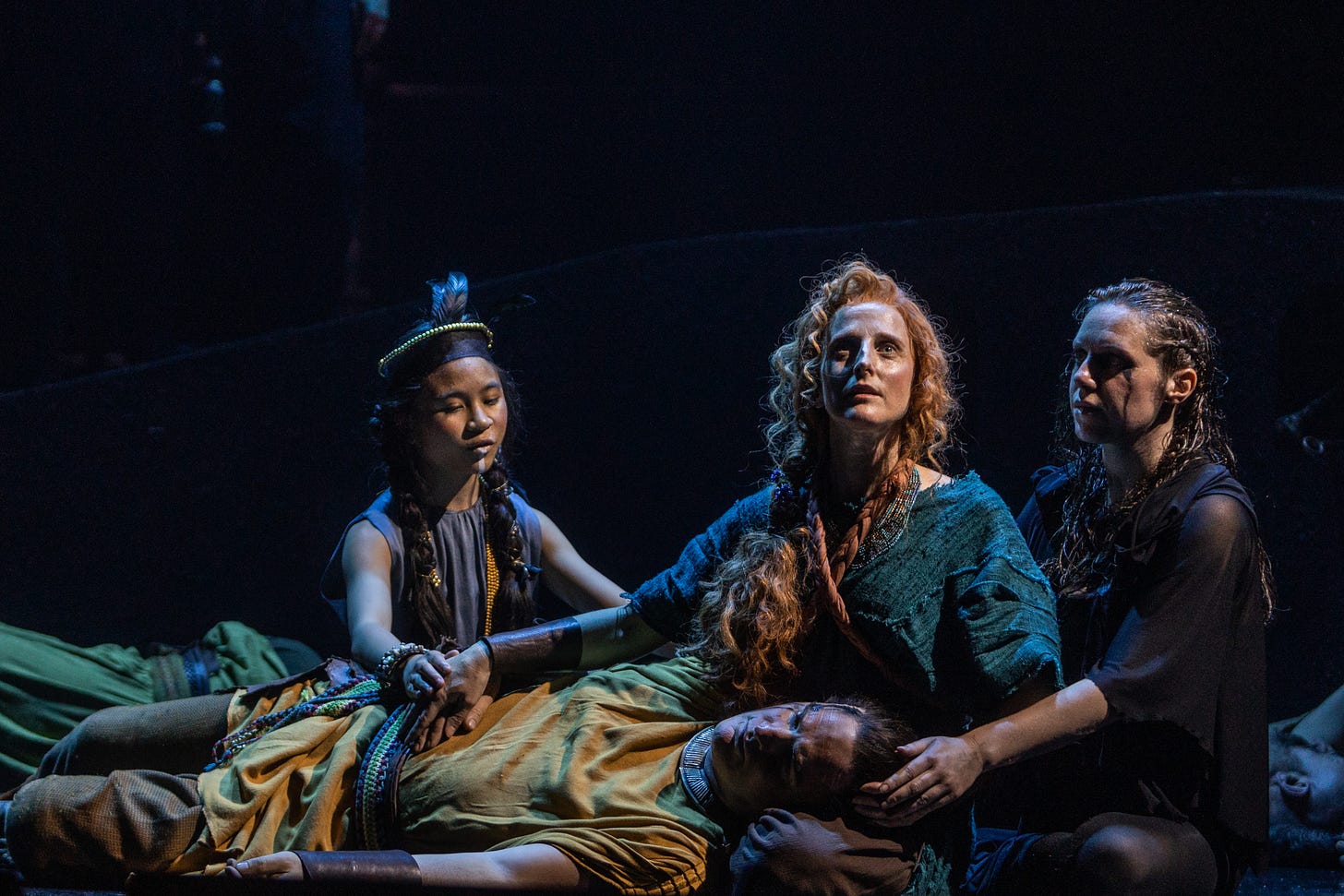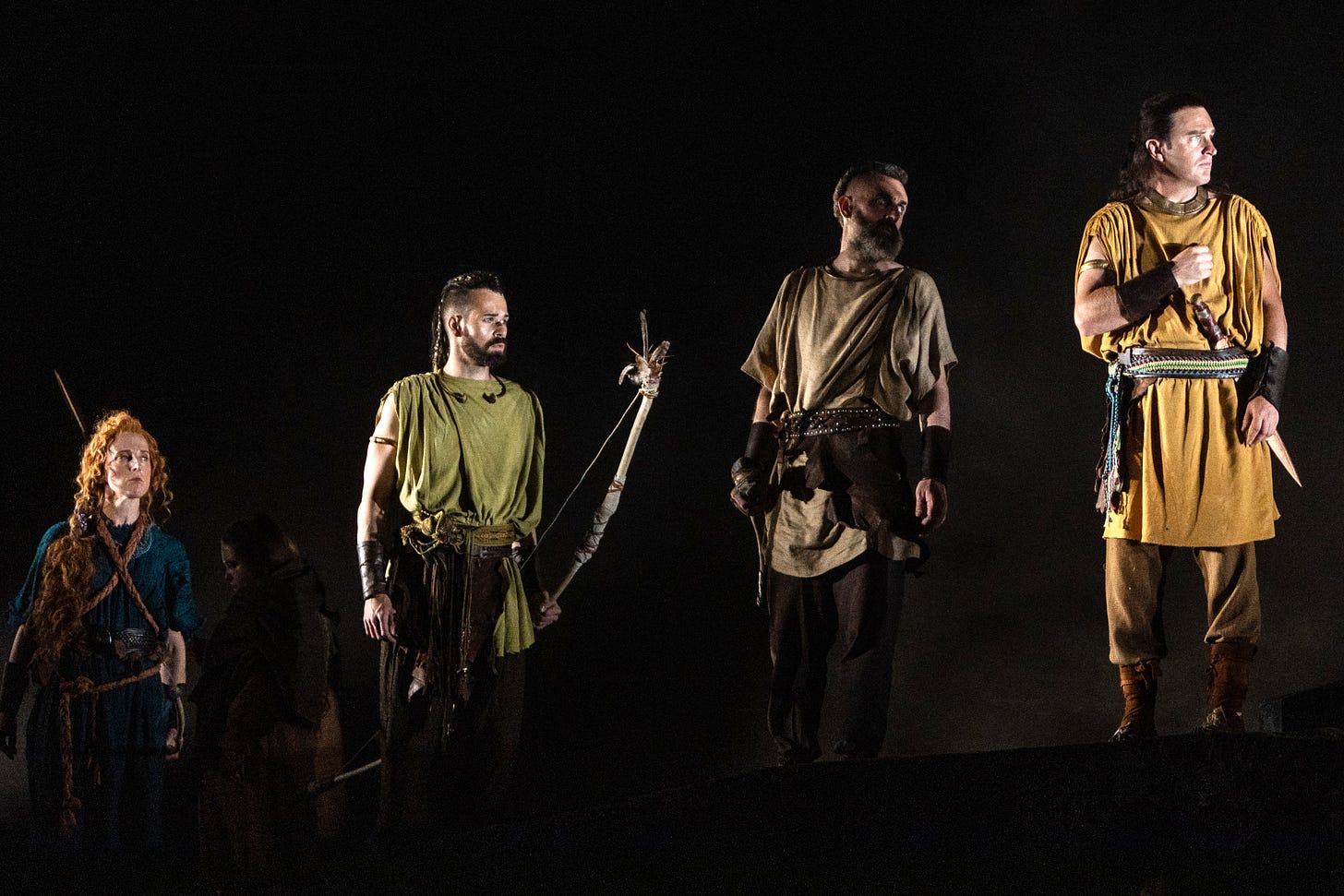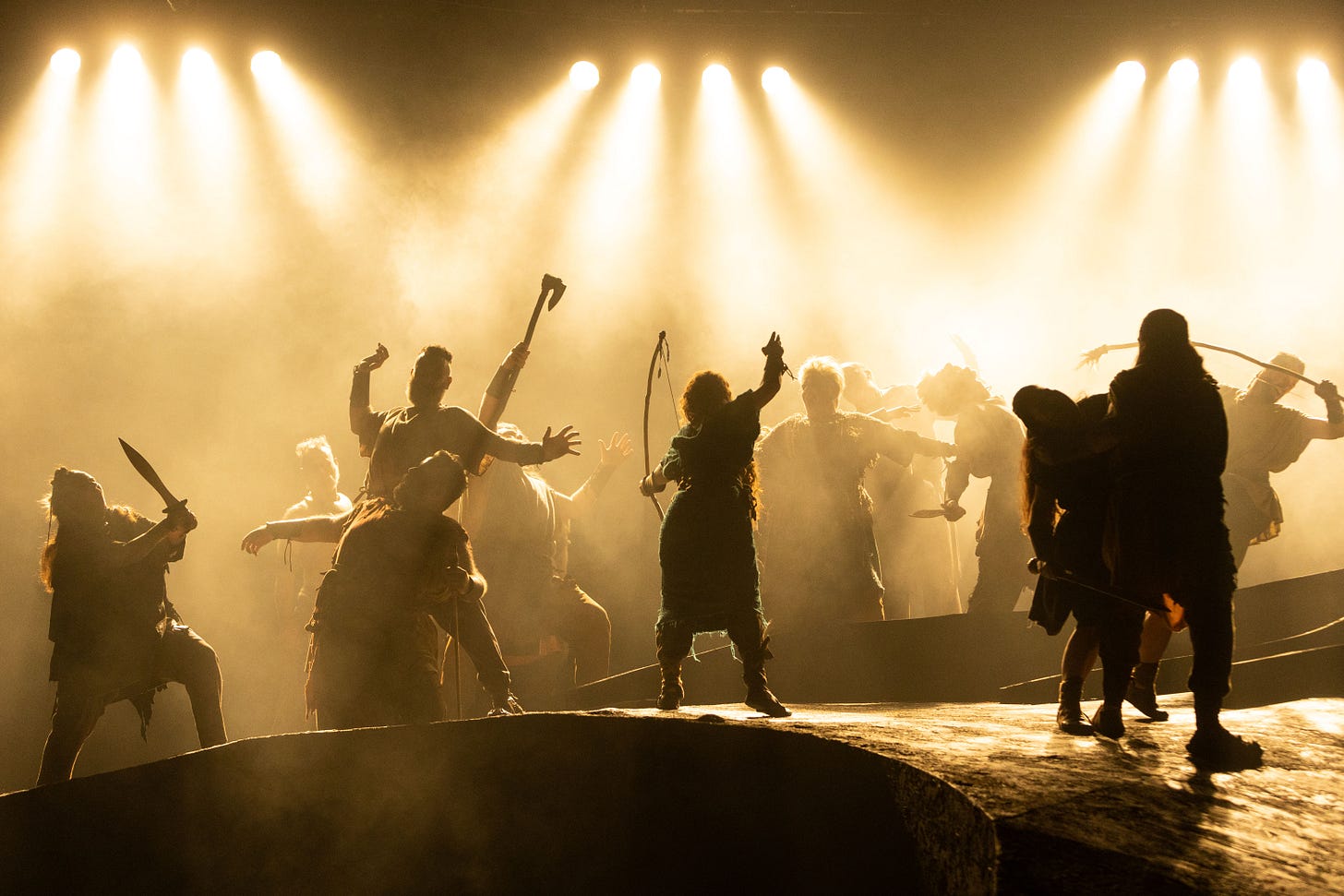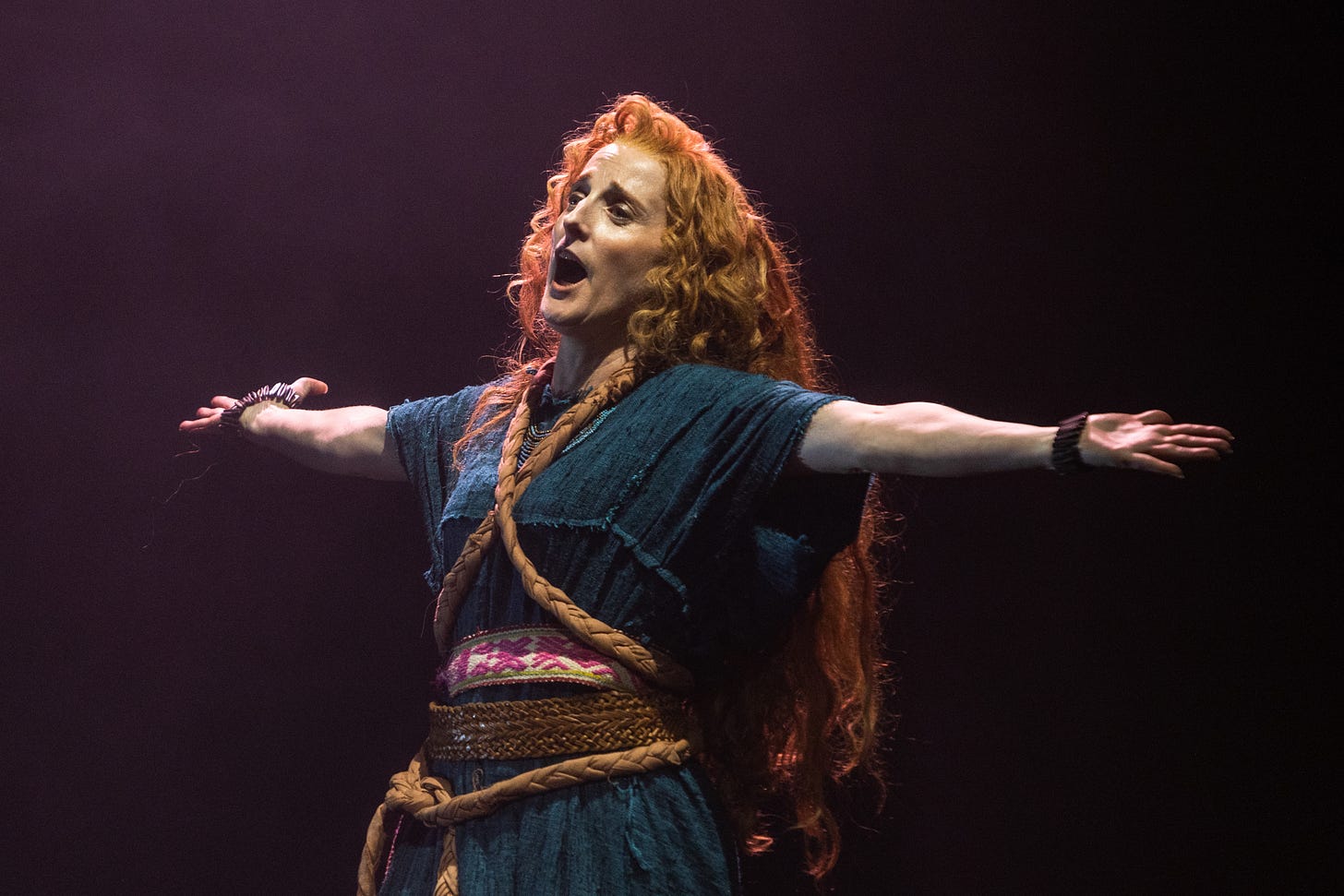Morrígan: a homegrown opera and a half
A stunning new opera based on Irish mythology which brings genuine goosebump moments and a blend of local talent and international performers.

It’s no spoiler to say that Morrígan doesn’t have a happy ending, based, as it is, on the ancient Ulster Cycle Irish myth of Deirdre of the Sorrows.
But it was all smiles for the cast and creative team of the newly minted opera as the curtain fell to rapturous applause and a standing ovation at its Cork Opera House debut.
Morrígan is an opera with all the polish of a druid’s burnished torc.
Here is a cast that mines a rich seam of local talent and salts the mine with a scattering of international gems. The music is performed and conducted with the same finesse with which it was composed, and the staging is of considerable creative vision.
At its premiere Thursday night, there were audible sounds of disappointment from the crowd as writer and associate director Eadaoin O’Donoghue took to the stage before the performance to announce that Cork singer Karen Underwood, set to play one third of a trio representing the goddess Morrígan, had been injured and could not perform.
The audience were also informed that the premiere was being audio recorded for Lyric FM.
The curtains open on a prologue familiar to anyone who has been through the Irish school system.
A baby is brought before the Ard Rí, Conor Mac Nessa, played here by South Korean tenor Jung Soo Yun, and druid Cathad (Julian Tovey, UK) makes a terrible prophecy: the baby, Deirdre, has the power to tear Ireland apart. The king orders her kept “out of sight of evil eyes” and charges midwife Leabharcham with her care.
And it’s Cork soprano Majella Cullagh who absolutely steals Act I as Leabharcham. It’s a powerful, humorous, tender performance, in a role very reminiscent of that of the nurse in Romeo and Juliet.
In fact, in the interval, there’s time to reflect on just how familiar many of the dramatic themes and tropes of this Irish mythological tale actually are: star-crossed lovers? Check. A king destroying his own kingdom in a fit of rage? Check.
Morrígan also proves just how well suited to opera Irish mythology, with its lust, revenge, honour and battle, actually is: if its composer and director, John O’Brien, first struck gold with a Greek tragedy, Dido and Aeneas, over a decade ago, here, working with writer Eadaoin O’Donoghue, who composed the Libretto, he has done it again but with a tale far more familiar and closer to home.

Musical highlights come thick and fast in Act II. Deirdre and Naoise’s fireside love duet is tender and gorgeously romantic.
There’s harp wizardry as Deirdre bids farewell to Alba in the knowledge that her return to Ireland means certain death, and genuine goosebumps from the power of the refrain from the chorus and ensemble in the third scene: Pity the land that feeds its spite/but does not feed its children, Conor Mac Neasa’s starving subjects sing, as the vengeful king neglects everything in his hunt for his eloped bride.
Innovative and beautiful set design by Alyson Cummins makes ingenious use of reflective surfaces and plays with perspective by creating a raked stage for the excellent ensemble and chorus to form tableaux on, but maybe has the downside of slowing down the action at times as performers navigate its steep terrain.
Perhaps the fluidity and brutal decisiveness of movement that should be present, especially in battle scenes, will improve over time as performers acclimatise to the scramble?
The three brothers Uisneach, who flee with Deirdre to Scotland (Alba) are played and sung with aplomb, with some surprisingly beautiful moments reserved for high countertenor Viktor Priebe, who plays Ainnle. There’s a genius touch in keeping one brother, Ardán, played by actor Gavin McEntee, silent: the Harpo Marx of Irish mythology.
This is an all-round stunning production, with the potential to fuse an explosion of similar output. Morrígan is by no means the first time the Ulster Cycle has inspired Irish composition, but a revival of interest in the turgid dramatic potential of Irish mythology, not truly visited since the Sláine graphic novel of the 1980s, would be welcome.
As long as we don’t impose current political sensibilities on it too much.
Lady Gregory famously sanitised evidence of a pre-Christian morality in her translations of this tale and others in the Ulster Cycle in the early years of the Irish state, while Thomas Kinsella put all the sex, gore and female power back in, with his translation of the Táin in the 1960s, simply by delivering as direct and unfiltered a translation as possible.
If there’s any downside at all to the fantastic piece of art which is Morrígan, it’s in its attempt to downplay areas that may make modern audiences squeamish.
In other versions of this myth, Deirdre is kept with the express intention of becoming Conor Mac Nessa’s wife from birth: Leabharcham is part nurse, part jailor. She is his possession, from the beginning.
The druid Cathad’s vision is more specific than depicted: here is a woman whose beauty will destroy Ireland. Yet in the Morrígan Libretto, this, too is downplayed in favour of a kind of general sense of foreboding and Deirdre is imbued with more of a Disneyesque all-round feistiness.
As a result, although being billed as “visceral and primal,” Morrígan loses a little of the full-blooded sensuality and sexiness that could easily be present. If Greek mythology is enthusiastically scattered with bestiality and child sacrifice, I don’t think Irish mythology will suffer too much by comparison.
But this is a minor and debatable point.
Overall, the message here is to go and see this masterful production if you can get tickets, and if you can’t, don’t worry too much: Morrígan will most certainly be back.
Morrígan is on in Cork Opera House on Saturday, July 30 and Sunday, July 31. Tickets are available here.






